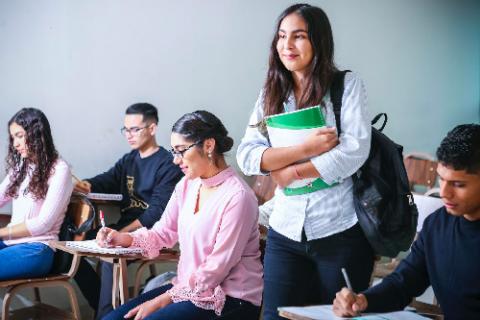Request assistance for special arrangements
For teaching assistance: contact your higher education institution to explain your needs.
For personal assistance for everyday life:contact the MDPH disability agency for the Haute-Garonne department.
Contact the institution in question as early as possible - in January of your last year of high school, for example -, to get information about the various types of assistance available.
Assistance and support at the university
Each university has a scheme for welcoming and supporting students with a disability, backed up by a multi-disciplinary team (teachers, students, academic services, preventive healthcare, associations).
After assessing your needs, the welcome scheme puts in place teaching assistance and supportive measures adapted to your circumstances. The assistance available includes:
Technical assistance:
- Loan of photocopy cards;
- Braille transcriptions;
- Loan of appropriate equipment.
Human assistance:
- Student note-takers;
- Teachers providing extra tutoring;
- People to read aloud from textbooks;
- French sign language interpreters or cued speech coders.
Accessibility:
- Visual identification inside buildings depending on your subject;
- Access to your classrooms;
- Assistance for library work.
Support to find an internship
At the university, a welcome scheme may offer you support to help you find an internship via the Professional Integration Assistance Office (B.A.I.P).
To obtain help with aspects of everyday life (meals, personal hygiene, mobility): you need to submit a PCH (disability allowance) request to the MDPH.
In engineering schools, business schools and specialised schools:
Your point of contact will usually be a disability correspondent. Failing that, get in touch with the director as soon as you have made the decision to study at one of these schools. The school’s open day is a good opportunity to make contact, even when you are still in sixth form or high school.
© Source : Guide Handi + Onisep



